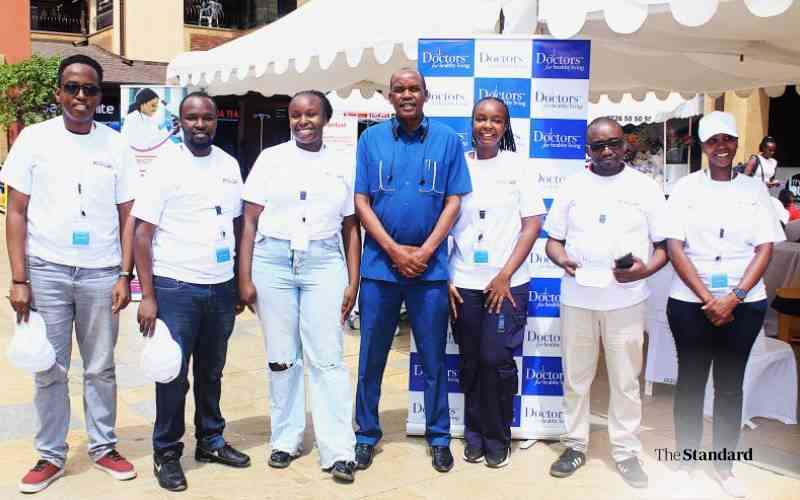
From (L): Fredrick Waititu, Samwel Mahugu, Cynthia Omenge, Dr Geffrey Mutuma, Sarah Masila, Stephen Kimani, and Joanne Kabure during the Launch of a campaign dubbed 'Know your numbers' that involves Body Mass Index (BMI), and blood pressure. June 1, 2025. [Benard Orwongo, Standard]
Health experts are calling on the Ministry of Health to expand sensitisation efforts on diabetes and hypertension (high blood pressure) to rural areas, warning that many people are dying before they are diagnosed.
Dr Geoffrey Mutuma, a consultant pathologist and cancer researcher at the Kenya Medical Research Institute, said health outreaches are crucial in reaching people who avoid hospital visits.
"Three out of ten people don't know they have diabetes or hypertension," said Mutuma.
"Statistics show that about 30 per cent of Kenyans have high blood pressure but are unaware of their condition."
He said many people collapse and die from stroke-related complications.
"Stroke can leave one side of the body paralysed. Some affected individuals are young and become permanently disabled, they can neither work nor feed themselves," Mutuma said.
- Nairobi health workers protest salary delays as county pledges payment soon
- Why Kenya's babies are missing mother's milk
- How genes may influence breast milk production
- UHC workers threaten strike, demand permanent terms and gratuity
Keep Reading
Speaking during a health outreach programme in Karen, Nairobi, at the weekend, Mutuma emphasised the need to bring health services closer to the people.
"Doctors for Healthy Living is focusing on going where the people are," he said.
Mutuma recommended regular screening for blood pressure, blood sugar, cholesterol, and weight, especially among the elderly and retirees.
"People in their 30s and 40s are active, but many retire into a life of disease. Most people above 60 have diabetes or hypertension," he said.
He warned that non-communicable diseases (NCDs) are silent killers.
"People die from diabetes and hypertension-induced strokes before they ever see a doctor. These diseases are not painful, and most people only visit hospitals when vital organs like the kidneys or brain are already damaged."
Chris Irungu, 55, who attended the outreach, said he is committed to healthy living. "My family has a history of diabetes and hypertension. I exercise and watch my diet," he said.
Edward Mburu, whose mother is battling diabetes in Kiambu, also shared his experience.
"Though she has managed the disease, it's expensive. She takes medication daily and needs frequent hospital visits," he said.
Mburu now prioritises regular testing and learning ways to prevent diabetes and hypertension.
Mutuma emphasised that diabetes and hypertension require lifelong management to prevent complications such as kidney failure and stroke.
He advised people to eat a balanced diet rich in whole grains, fruits, and vegetables, and to strictly adhere to medication.
"Young people must start watching what they eat today because it determines their future health," he said. "We are committing suicide with our spoons-what you eat is what eventually harms you."
He raised concerns about men's dietary habits. "Many men have high cholesterol because they consume a lot of meat but rarely eat fruits or vegetables."
Diabetes, hypertension, and cancer are among the leading non-communicable diseases (NCDs) in Kenya.
The current national prevalence of diabetes is estimated at 4.5 per cent, up from 3.1 per cent in 2019. If no action is taken, this figure is projected to reach 4.4 per cent by 2035.
In 2015, Kenya recorded at least 8,700 diabetes-related deaths.
Currently, there are about 2.3 million diabetes cases in Kenya, a number expected to rise to 3.5 million by 2045.
Due to limited awareness, many diabetes cases are diagnosed late, sometimes after complications like diabetic foot, characterised by loss of nerve sensation in the legs, have already set in, leading to amputations.
Additionally, about 4.8 million Kenyan adults aged between 30 and 79 years have hypertension.
Yet, according to the Kenya Health Facility Assessment 2018, 44 per cent of health facilities cannot diagnose or manage hypertension.
To combat this, the government has prioritised hypertension and cardiovascular diseases in its national NCD strategic plan, which aims to reduce premature deaths caused by NCDs by a third.
 The Standard Group Plc is a multi-media organization with investments in media
platforms spanning newspaper print
operations, television, radio broadcasting, digital and online services. The
Standard Group is recognized as a
leading multi-media house in Kenya with a key influence in matters of national
and international interest.
The Standard Group Plc is a multi-media organization with investments in media
platforms spanning newspaper print
operations, television, radio broadcasting, digital and online services. The
Standard Group is recognized as a
leading multi-media house in Kenya with a key influence in matters of national
and international interest.











